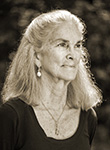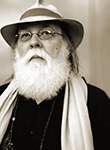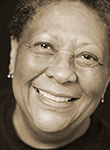Recommendations, Community, and Remembrance
Mary Flinn, Blackbird Founding Editor
Welcome to Blackbird’s In Previous Issues. Here we call your attention to work in our archives that for one reason or another has particular resonance against the work being newly published and/or the moment in which we are publishing. In addition, we will recognize work by old friends who are also current contributors and significant book-length material that we believe deserves steady and ongoing attention.
Sadly, we mark the passing of two former contributors, Kelly Cherry and Bernard Martin, who have died in recent months. Both were artists of distinction, and coincidentally, both had deep roots in Virginia.
Cherry first appeared in v7n1, writing about George Garrett, her friend and former teacher. She herself was the inaugural recipient of the Rebecca Mitchell Tarumoto Short Fiction Prize for her story “On Familiar Terms,” which appeared in v10n1. Fiction writer Lee Zacharis, who was also her friend, kindly remembers her for this issue of Blackbird. Art in all of its manifestations was intrinsic to Cherry’s connection to the world and the people in it. She acknowledges this connection as she speaks of music through the character Callie in her story:
Is it a dream, then, music? Does it separate you from people? It does, she thinks, and it doesn’t. Through music, she knows people, their innermost feelings. Music is a real and reckonable force in the world. It speaks to everyone, knows everything . . .
Bernard Martin was a pillar of the Richmond visual arts community and a long-time professor in Virginia Commonwealth University’s School of the Arts, where he was the first chairman of the department of painting and printmaking. Blackbird published two presentations of Martin’s work: Stagecoach: The Paintings, in v13n1 and Perhaps He Should Have Stayed in the City, in v17n1. Stagecoach: The Paintings is a bravura accomplishment in twenty-four large sequential paintings that represent one second of movie time from the classic film, starring John Wayne. As art historian critic Howard Risatti has noted of his work, “Martin seems to be saying, ‘Take time, look carefully and think, details matter.’ And he’s right, details do matter.”
The seventh annual Claudia Emerson Reading Loop features Brian Brodeur’s interview with Emerson for his blog “How a Poem Happens;” the text of “Photographer,” the poem discussed in the interview; the poem “Triptych;” and a selection of photographs of Emerson’s Richmond study. Blackbird’s relationship with Claudia Emerson’s work began in v1n2 with a review of Pinion, her second book. Four poems from the Pulitzer Prize–winning collection Late Wife appeared in v2n1. Other Blackbird appearances include the title poems for Secure the Shadow in v9n1 and The Opposite House in v12n1. These poems enable us to hear her voice and recall her presence.
Margaret Gibson first appeared in v1n1 with four poems tied to images from classic Japanese scroll paintings, along with a reading of the poems and a discussion of their origins. Other appearances in Blackbird have featured a suite of poems from her collection Broken Cup in v11n2 and two memoir essays in v6n1 and v6n2. These lines from her poem “Corn Mask,” published in this issue, provide a coda to a body of remarkable work:
I want to live in the spirit of strict
pleasure,
a form of generosity
that allows for an earthbound humanity.
Mark Jarman also first appeared in Blackbird in v1n1 with the poem “Canzone” and in v1n2 with the essay “Happiness: The Aesthetics of Donald Justice” and an interview discussing Justice’s influence as a writer and teacher. More recently, new poems were published in v18n1. Jarman’s work always calls us to pay attention to the intersections where the spirit, the body, and the overwhelming beauty and pain of the natural world conjoin, and for this we are grateful.
In “Canzone,” Jarman told us
I’m glad Giovanni di Paolo saw the arrival
Of souls in paradise as a time for reunion,
And not merely a mingling of bodiless ghosts.
I wish I could believe in that promise of paradise
As deeply as I believe in this mortal body.
Three poems from Matthew Wimberley’s Daniel Boone’s Window (Louisiana State University Press, 2021) appear in v19n1. A review by Danielle Kotrla of Daniel Boone’s Window appears in this issue.
Hayley Graffunder, Blackbird’s managing editor from 2020–2021, explored her experience with Blackbird editorial work during the height of COVID-19 in her essay “Managing Remotely: Blackbird in Pandemic,” which appeared in v20n1. We keep this here as witness to all of our devoted work during the pandemic.
~
Serial Publications in Blackbird
Blackbird has published two full-length books in our pages and is in the process of publishing two more.
Early on, Blackbird presented the entirety of Norman Dubie’s The Spirit Tablets at Goa Lake, a book-length futurist poem. The poem was issued serially in three parts, beginning with the “Book of the Jewel Worm” in v1n2. It was followed by the other two sections, “Book of the Jaspers” and “The Book of Crying Kanglings,” in v2n1 and v2n2, as well as a helpful introduction and glossary. As Dubie states in a note to the piece,
This futurist poem enjoys the broken narration of its hero, Paul Ekajati, an amateur mathematician who once taught the Calculus on our moon. He is now an exhausted buddhist Vajramaster living in a small village at the Bakavi Lake Mining Colony on Mars. The year is 2277. Yeshe Khandro is in her last black ovum. Or, I should say that a raised mischievous voice in the poem belongs to a dakini “wisdom traveler in space” and that she is the destroyer of the Vega Remnant, LXT. There are eleven spirit tablets.
Nobel Prize-winning author Tomas Tranströmer’s 1996 book Sorgegond olen (Sorrow Gondola), in a new translation by Patty Crane and accompanied by the original Swedish, was published in Blackbird v10n1. To accompany the new translation Jean Valentine provided a letter to the Nobel laureate and David Wojahn presented a compelling meditation on literary friendship and correspondence in “Unlikely Magic, (on Airmail: The Letters of Robert Bly and Tomas Tranströmer).” There, Wojahn states, “The great subject of the poetry of Tomas Tranströmer—sometimes it seems as though it is his only subject—is liminality. He is a poet almost helplessly drawn to enter and inhabit those in-between states that form the borderlines between waking and sleeping, the conscious and the unconscious, ecstasy and terror, the public self and the interior self. Again and again his poems allude to border checkpoints, boundaries, crossroads: they teeter upon thresholds of every sort—be they the brink of sleep or the brink of death, a door about to open or a door about to close.” In v19n1, Blackbird published six new Crane translations of Tranströmer poems.
Since Wesley Gibson’s death in December 2016, Blackbird has contemplated ways to ensure his literary voice maintains a presence in the world. With that end in mind, we are in the process of reproducing his book, You Are Here: A Memoir of Arrival, which was published in 2004 by Back Bay Books. The book, in part, is an account of Gibson’s witness to the HIV/AIDS crisis and its effects in New York City. Hailed at the time by Mary Gaitskill as “dark and sparkling, wonderfully intelligent, flip, and deeply felt,” You Are Here affords an excellent vehicle for honoring Gibson’s many strengths as a writer and his generosity of spirit as a friend. The first installment appeared in v17n1, with the next four appearing in v18n1, v18n2, v19n1, v19n2, v20n1, and v20n2. The penultimate installment appears in this issue. A review of You Are Here and a reading by Gibson were published in v3n1. His story, “The Raccoon,” appeared in v10n2.
Marilyn Nelson has for many years celebrated her friendship with Danish writer Inge Pedersen by translating her work, thus making it more available to the Anglophone world. Nelson’s translations of poems from Pedersen’s Den trettende måned appeared in Blackbird v1n1. Her translation of “Clouds and Fire Engines,” an excerpt from Pedersen’s last novel, The Path Leads through the Air, appeared in v18n1, followed by “The Apple” in v18n2, “Seedings” in v19n1, “Mail” in v19n2, “That’s How It Goes Here” in v20n1, and “Putting a Letter in the Mailbox” in v20n2. The novel continues in this issue with “I Said Nothing.” Nelson herself is the author and translator of more than twenty books of poetry for both children and adults. ![]()
Contributor photos link to an index of previous work in Blackbird.











